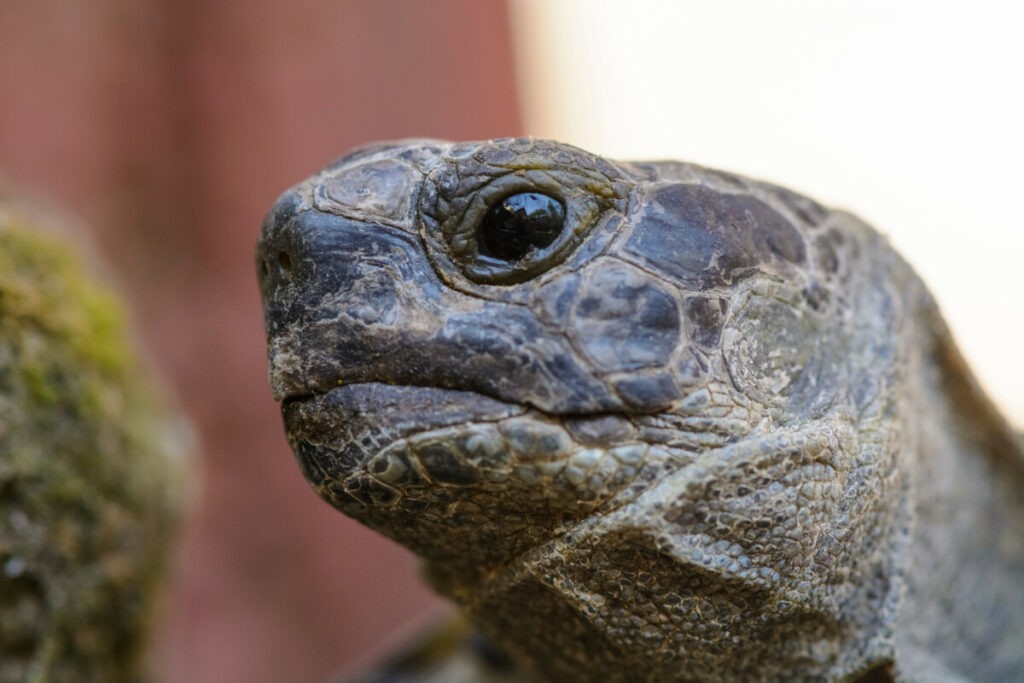
It is hard to see the ears of many different animals, even if they have them. Birds and reptiles especially are animals that have ears but they are covered and hard to see. So do tortoises have ears and can they hear?
Tortoises can hear very well. They have ears that are covered by skin flaps. They can hear infrasound (low vibrations that humans cannot hear that are found on the lowest end of the sound spectrum). Tortoises can also hear loud and high-pitched sounds, however, these can stress them out.
So, how is their hearing different and affected by their specialized ears? What else should an owner consider when thinking of their tortoise’s ears? Read on to find out!
Do Tortoises Have Ears?
Tortoise ears are located on the sides of their heads. You can often find them by following the line of their mouths to where their skin changes color, often in the pattern of a circle.
This small circle is where their ear is covered by a flap of skin. The flap of skin is very important to the health of a tortoise’s ear.
The skin, called the tympanum, captures sound waves before they are transmitted to the inner ear. Their inner ear goes right to their eardrum and lands very close to their brain.
A reason many people are under the misconception that tortoises cannot hear, or do not have ears is that their ears are completely internal.
Our ears have flesh and cartilage around them in order to catch more sound, however, tortoises hear low sounds and rely on vibrations more than sound waves in order to detect predators and prey.
This means they do not need to have external ears in order to hear and keep themselves safe. Their internal ears keep them protected from infection as well as provide them with a sense of hearing that proves quite useful for keeping them safe in the wild.
How Well Do Tortoises Hear?

Tortoises can hear very well. They can capture sound ranging from 10 to 182Hz. They rely on the vibrations of these sounds, so higher frequencies are not detected by tortoises but they can hear lower frequencies than even humans can.
A human’s range of sound might be much larger, from 20 to 20,000Hz, but as you can see, tortoises can hear starting at a lower frequency than us. Some think the reason they can hear such low frequencies and rely on vibrations is so they can hear predators coming from far away.
They would need this skill because of how slow they are; it allows them to stay safe even though they are slower than most other animals.
The flap covering their ear, the tympanum, is about .25 millimeters thick. It does not stop the tortoise from hearing, but instead allows them to detect vibrations more easily. Their middle ear then sends the vibrations to the inner ear, which is made up of tissue and sinuses.
In all, tortoises hear very well, but not in the way we usually think of hearing. Their sense of hearing is supplemented by their attention to vibrations and low frequencies. This helps them in many ways both in the wild as well as in your home!
Do Tortoises Recognize Their Owner’s Voice?
Tortoises have very good hearing, so can they recognize your voice or sound? Tortoises are very sensitive and can start to understand people based on their tone and touch.
The way they respond to your voice may not be what you are expecting, however. Your tortoise will likely recognize you by your tone and not necessarily the exact sound of your voice.
Signs that your tortoise recognizes you, whether by your voice or using another one of its senses, can be different depending on the tortoise! However, most tortoises will show that they know you by simply being calm in your presence.
They will be open to touches and not scared of sounds you make. The best way to tell is by seeing if they enter their shell around you.
When a tortoise retreats into their shell, it means they feel scared or threatened. If they extend their neck while you are around, it means they feel perfectly safe around you! If they trust you, they recognize you!
What About Their Other Senses?

A tortoise’s other senses are fairly developed, but not much like our own. They have a decent sense of taste as well as smell, being able to choose a favorite food such as lettuce or strawberries, as well as being able to tell food from other objects in front of them.
Their sense of smell can be especially useful for specific species! Some species can lay down scent trails that can lead other tortoises to shelters or away from dangerous places. Their sense of smell and the power thereof often depends on the species.
A tortoise’s sight is not their best sense by far. They cannot see very far, nor in much detail, often relying on their other senses to get around.
Tortoises have okay peripheral vision but cannot see some colors. They can see reds and yellows, and some can see greens and ultraviolet colors, but that is about it for the sight of tortoises.
Tortoises Can Feel Touch Through Their Shell
Despite popular belief, they can often feel the slightest touch through their shell. They have many nerve endings in their shell, even though it is so hard.
So be as careful with their shell as you are with their skin; they can feel pain just as much in both areas. This also means they can feel pets and strokes and can be comforted by these touches as well!
While not a sense, their intelligence is fairly high! Many think that tortoises cannot learn or are animals whose brains cannot handle much information, however, they can get pretty smart in some cases.
They can learn and remember things well, often remembering things for up to 9 years! Their long life span obviously contributes to their long memory, making it more impressive simply due to the amount of time they live!
